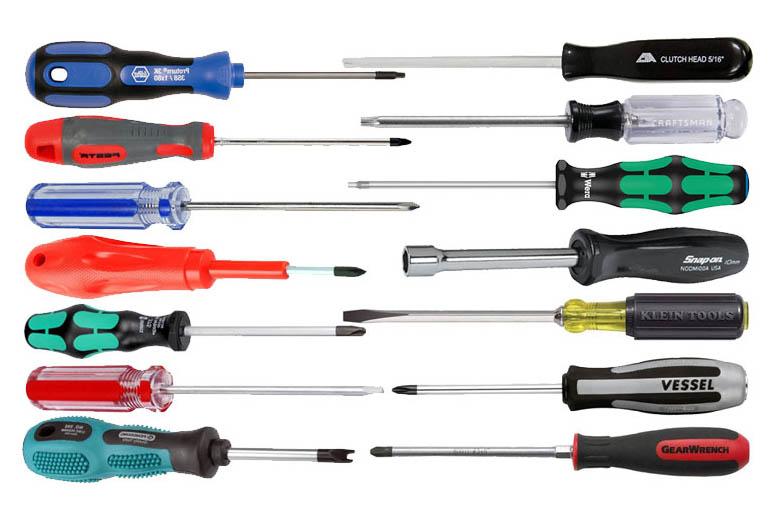Screwdrivers are one of the most essential tools in any toolbox. From assembling furniture to fixing electronics, these handy tools come in countless variations, each designed for a specific purpose. If you’re new to tools or just looking to expand your knowledge, this guide will help you understand the different types of screwdrivers and how to choose the right one for each job.
Importance of Choosing the Right Screwdriver
Using the wrong screwdriver can damage screws, wear out the tool, or even lead to injuries. Selecting the right screwdriver not only improves efficiency but also helps maintain the integrity of the materials and fasteners.
Basic Parts of a Screwdriver
Each screwdriver has three main parts that define its function:
- Handle: Usually made from plastic or rubber for grip and control.
- Shaft: The metal rod that connects the handle to the tip.
- Tip: The end that fits into the screw head, determining the type of screwdriver.
Common Types of Screwdrivers
Flathead Screwdriver
A Flathead screwdriver, or slotted screwdriver, is the most basic and versatile type. With a single, flat blade, it’s ideal for screws with a straight, narrow slot.
Uses and Features:
Often used for woodworking, household repairs, and in older appliances, flatheads are known for their simplicity.
Phillips Screwdriver
The Phillips screwdriver is probably the most common type, featuring a cross-shaped tip that fits securely into screws with a corresponding cross recess.
Ideal Applications:
Phillips screws are found in furniture, electronics, and automotive applications, where the cross-tip ensures a stable, slip-resistant grip.
Torx Screwdriver
With a star-shaped tip, Torx screwdrivers are frequently used in the automotive and electronics industries. They provide excellent grip and minimize the risk of stripping the screw head.
Industrial and Household Uses:
Torx screws are commonly found in cars, motorcycles, and many electronics because they require additional torque to turn effectively.
Specialty Screwdrivers
Precision Screwdrivers
These small screwdrivers are designed for delicate tasks, such as fixing eyeglasses or electronic devices. Precision screwdrivers come in various types, including flathead, Phillips, and Torx.
Hex Screwdriver
Hex screwdrivers (also known as Allen wrenches) are essential for furniture assembly and any work involving hexagonal socket screws. They’re also a staple in bike repair kits.
Robertson Screwdriver
Recognizable by its square tip, the Robertson screwdriver is primarily used in Canada and is popular in woodworking and construction.
Power Screwdrivers
For heavy-duty tasks, power screwdrivers provide a speed and efficiency boost. They’re especially useful for repetitive tasks or dealing with tough screws. Available in cordless and corded versions, power screwdrivers can save a lot of manual effort.
Materials of Screwdriver Tips
Different materials are used to enhance the durability and functionality of screwdriver tips.
Steel Tips
Steel tips are the most common, offering durability for most applications.
Magnetic Tips
Magnetic tips make it easier to hold screws, especially in tight spaces, preventing them from dropping or getting lost.
Choosing the Right Screwdriver Based on Task
- For Electronics: Precision Phillips or flathead.
- Furniture Assembly: Hex screwdrivers are most common.
- Automotive Work: Torx or Phillips are often required.
- Woodworking: Flathead and Phillips screwdrivers are preferred.
Tips for Maintaining Your Screwdrivers
Proper maintenance ensures that screwdrivers remain functional and safe to use.
- Clean the tips regularly to prevent buildup that can reduce grip.
- Store screwdrivers in a dry place to avoid rusting.
- Sharpen worn tips to restore precision if needed.
Safety Tips When Using Screwdrivers
- Wear gloves to prevent hand injuries.
- Always point the tool away from yourself.
- Avoid excessive force to prevent slips and potential accidents.
When to Upgrade to a Better Quality Screwdriver
If you’re noticing wear, rust, or a decline in grip, it may be time to upgrade. Investing in high-quality screwdrivers can save you money in the long run and improve your work efficiency.
Common Mistakes in Using Screwdrivers
- Using the wrong type for the job – can strip screws and damage materials.
- Applying too much force – leads to tool wear and possible injury.
- Not aligning the tip correctly – causes slipping and stripping.
Where to Buy High-Quality Screwdrivers
For professional-grade tools, consider trusted brands like Stanley, Craftsman, and Bosch. Many hardware stores and online retailers offer quality options that fit various needs and budgets.
Conclusion
Understanding the different types of screwdrivers can make all the difference in tackling home improvement projects, repairs, and DIY tasks. With the right tool in hand, each job becomes easier, faster, and safer. Keep this guide handy, and you’ll always be prepared to choose the right screwdriver for any task.
FAQs
1. What is the most common type of screwdriver?
The Phillips screwdriver is the most commonly used type due to its versatility in everyday tasks.
2. Can I use a flathead screwdriver on a Phillips screw?
It’s not recommended, as using the wrong tool can damage the screw head and the screwdriver.
3. How do I know if my screwdriver tip needs replacement?
If it’s rounded, worn down, or struggles to grip screws, it’s likely time for a new one.
4. What is the best material for screwdriver tips?
Steel tips are durable, while magnetic tips are useful for handling small screws in confined spaces.





